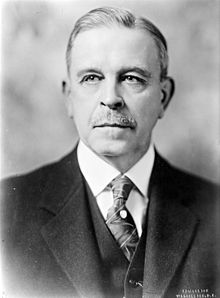Hubert Work
| Hubert Work | |
|---|---|
 |
|
| 29th United States Secretary of the Interior | |
|
In office March 4, 1923 – July 24, 1928 |
|
| President |
Warren G. Harding Calvin Coolidge |
| Preceded by | Albert B. Fall |
| Succeeded by | Roy O. West |
| 47th United States Postmaster General | |
|
In office March 4, 1922 – March 4, 1923 |
|
| President | Warren G. Harding |
| Preceded by | Will H. Hays |
| Succeeded by | Harry S. New |
| Personal details | |
| Born |
July 3, 1860 Marion Center, Pennsylvania, United States |
| Died | December 14, 1942 (aged 82) Denver, Colorado, United States |
| Resting place | Arlington National Cemetery in Arlington, Virginia, United States |
| Political party | Republican |
| Alma mater |
University of Michigan University of Pennsylvania |
| Profession | Politician |
| Religion | Presbyterian |
| Military service | |
| Service/branch | United States Army |
| Rank | Lieutenant Colonel |
| Unit | Medical Corps |
| Battles/wars | World War I |
Hubert Work (July 3, 1860 – December 14, 1942) was a U.S. administrator and physician. He served as the U.S. Postmaster General from 1922 until 1923 during the presidency of Warren G. Harding. He served as the U.S. Secretary of the Interior from 1923 until 1928 during the administrations of Warren G. Harding and Calvin Coolidge.
Work was born in Marion Center, Pennsylvania, to Tabitha Van Horn and Moses Thompson Work. He attended medical school at the University of Michigan from 1882 to 1883 and received an M.D. from the University of Pennsylvania in 1885. He settled in Colorado and founded Woodcroft Hospital in Pueblo, Colorado, in 1896.
Work was active in the Republican Party and served as the Colorado state chairman in 1912. In 1914, Work ran unsuccessfully in a special election for the United States Senate. He was defeated by Democrat Charles S. Thomas, later the governor of Colorado.
Work received 98,728 votes (39 percent) compared to Thomas' 102,037 ballots (40.3 percent). This was Colorado's first Senate election by popular vote under the Seventeenth Amendment to the United States Constitution. During World War I, Work served in the U.S. Army Medical Corps and attained the rank of lieutenant colonel.
...
Wikipedia
